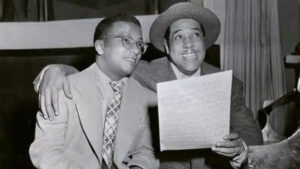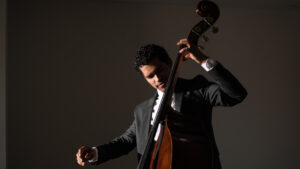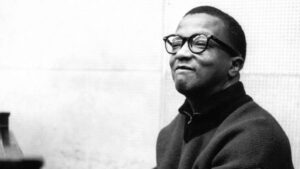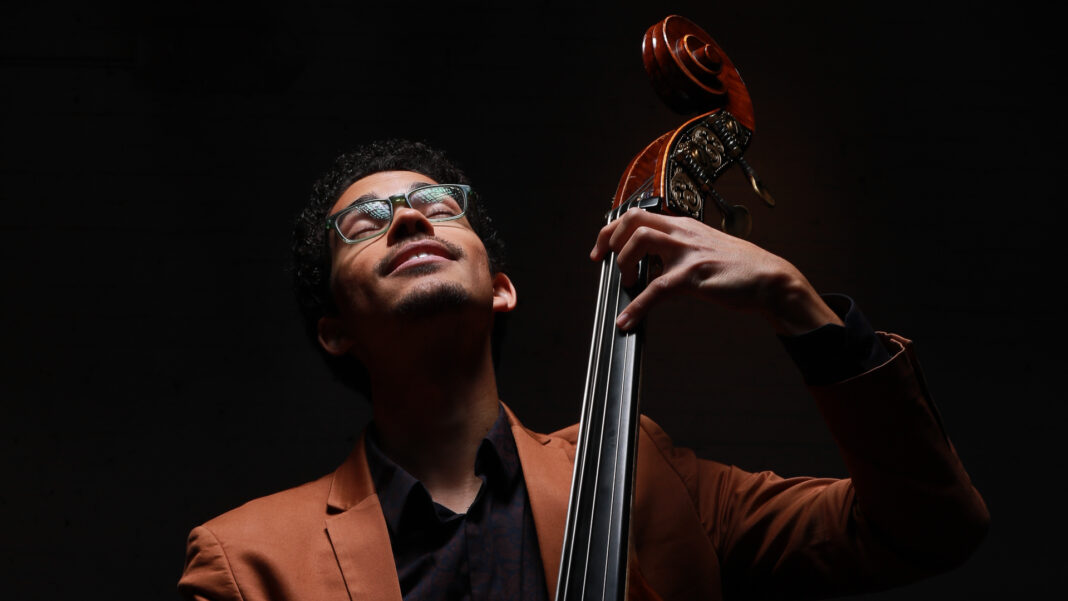
If you ask most people under the age of 50 who Billy Strayhorn was they will probably look at you with a blank face. Composer and musician Marlon Martinez, well under that age, would be able to tell you more about Strayhorn that you could possibly imagine. Unlike many of his peers, Martinez took an early interest in jazz.
“I was in middle school and I gravitated towards big band jazz,” he told me. “My parents knew that I was interested in it, so they bought me a lot of compilation CDs.” Remember compact discs?
Any good compilation of big band jazz was certain to include the music and recordings of Duke Ellington. But as Martinez kept listening he discovered something he couldn’t quite figure out at first.
“As the years went by and as I listened more and more to Duke Ellington, I started picking up on compositions that really resonated with me,” he revealed. “You know, I didn’t know at the time that those particular compositions were Billy Strayhorn’s compositions: Isfahan, Chelsea Bridge, Clementine, all these other compositions. I was assuming it was just Duke Ellington’s compositions and his music.”
It took a few documentaries hearing Strayhorn’s name regularly mentioned with Ellington’s and for Martinez to start digging deeper. His studies in music provided some clarity about the music he’d been listening to and the help of a teacher pointed Martinez in a direction that would change his life.

“I went back to Duke Ellington and I listened to The Nutcracker Suite, Such Sweet Thunder and other orchestral suites. I heard these compositions again. My ears had developed so much through school that I started to pick up on harmonies and chords and melodies that I really liked and these particular pieces sound a little different from Duke’s pieces. One of my orchestration teachers, Joey Sellers, let me borrow his copy of David Hajdu’s Lush Life book. I read that and fell in love with Billy Strayhorn right then and there.”
Where it went is impressive. Through Colburn Conservatory of Music, where he went to school, Martinez created an eight-part video series called Ever Up And Onward: A Tribute to Billy Strayhorn. It’s an impressive series of videos that cover multiple aspects of Strayhorn’s life and music.
On January 16th, Martinez will release an album with his Marlonious Jazz Orchestra entitled Marlonious/Strayhorn – a combination of Strayhorn’s songs (using the composer’s original charts) and originals written by Martinez. They will be performing selections from that record on December 7th at the Clive Davis Theatre at the Grammy Museum in Los Angeles.
When asked how he differentiated between what was written by Ellington and what Strayhorn had composed, he didn’t hesitate.
“Billy Strayhorn has a legato melodic sensibility that I feel is not in Duke Ellington’s music as much,” he offered. “Strayhorn has that element. He also has harmonic elements that aren’t really characteristic of Duke Ellington, like his frequent use of melodic minor or minor 11 chords instead of your minor seven or the half diminished chord. There’s also a tinge of sadness in Strayhorn’s music that separates him from Duke Ellington. That does not mean that Duke Ellington is not deep, but they’re just both so deep in their own way. Billy Strayhorn has that emotional content in there.”
Strayhorn was an anomaly for his time. He was an openly gay Black American. He came out before the expression existed. That emotional content that Martinez spoke about is nowhere more pronounced than in the song Lush Life, a song Strayhorn wrote as a teenager.
“It’s more like a poem. The music is set to a poem. It has more of a classical sense to it. I think it’s rhapsodic. It has a different kind of flow from the regular song styles at the time. Lush Life has those twists and turns that’s usually going to be hard to interpret. Lyrically I think it’s very sophisticated; very mature lyrics.”
It’s a classic song that has been recorded by a who’s who of popular and jazz music: Nat King Cole, John Coltrane, Ella Fitzgerald, Lady Gaga, Johnny Hartman, Bettye LaVette, Frank Sinatra, Donna Summer, Sarah Vaughan and more. Perhaps the most surprising rendition of the song is the one recording Strayhorn made of this notoriously challenging and profoundly emotional song.
“It’s faster. He has a theatrical take to Lush Life. I think that makes a lot of sense because Strayhorn was so inspired by musical theater. It seems like something that is like a staged song. Something where you would have choreography, you’d have acting, you’d have a bit of singing. I feel like that’s kind of the narrative in which Strayhorn wrote Lush Life.”
As passionate as Martinez is about Strayhorn, he also knew he has to create a link between the music he writes and the music he loves – while still maintaining his own sound and vision.

“I find my music is very much centered in the rich tradition of big band writing and the styles from the forties, fifties and sixties. But played in a contemporary way, in a contemporary context. What I seek to do, even to this day with all my projects, is to show how Billy Strayhorn has inspired my writing. I wanted to pick Strayhorn repertoire that covers many areas of his style or many of the styles that he has. Then sprinkle in some of my compositions to be more of a commentary on Billy Strayhorn’s writing.
“This album will be the first big band album that I’ve produced. I think it’s wise to showcase some of my work as well. This is his world of writing and then here’s my writing. It moved me to do these compositions this particular way. So I think that is definitely carrying the torch and then passing it on to the listener.”
Martinez is under no illusion that the music he loves and the music he writes is not the type of music you find topping the charts today.
“I think the main challenge is showing people that these chords and this type of instrumentation isn’t old. It’s not a thing of the past or a memory. I’m not trying to be a cover band and I’m not trying to be a cover band in the way I write music either. I feel that there’s a stigma around jazz and big band music that needs to be broken. The challenge is how do you make something that’s genuinely what you want to write and not deter people from thinking, ‘Oh, it’s sounds like In the Mood or Take the A-Train.’ I haven’t found the big answer here yet, but I think the fact that I’m writing this music makes it appealing to people because I’m a young musician, a young musician of color. I’m writing this music dedicated to the people in the past and presenting it today. I think the younger generation coming after me they’re going to appreciate it, too.”
Of course Martinez could just follow Strayhorn’s own philosophy: “If you want something hard enough, it just gets done.”

“I was thinking about that quote literally yesterday. That’s always driven me,whether it’s through finding venues and convincing people that this is a band that needs to be heard and contracting musicians and convincing them that this music will be fun and it will be something that you’ll want to play with your your friends in the section. I don’t have to do this kind of music. I don’t have to be a big band composer at this time and be successful at it. There are so many other avenues that I could take, but I love it so much that I’m going to see to it that I do this for the rest of my life.”
Which, of course, sounds like Martinez does have to do this kind of music.
“I do because I have the passion for it. Hypothetically I can say I’ll do the other things that I like to do, like play in symphony orchestras. I can do that and then retire off that and whatever. I find joy in doing that. I find joy in being a sideman on bass for someone else. I can write all kinds of music, but I have the urge and the itch to just write big band music and direct big bands. So that’s what I’m going to do.”
To see the full interview with Marlon Martinez, please go here.
Main photo: Marlon Martinez (Photo by Imran Stephen/Courtesy MarlonMartinezMusic.com)











